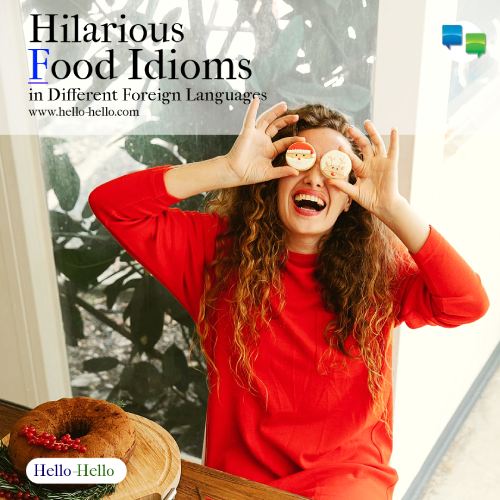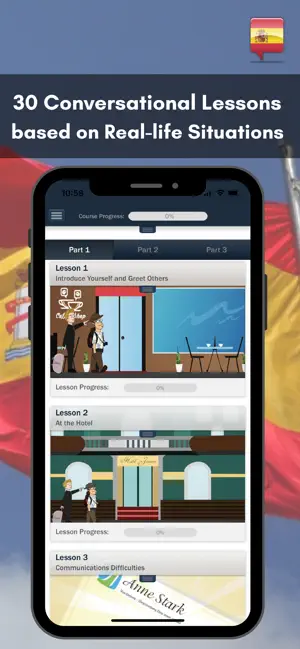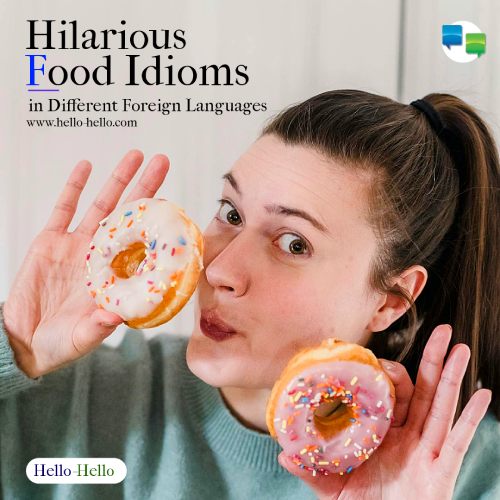Food idioms add a flavorful twist to languages, offering a unique insight into the cultural quirks and culinary metaphors that make each language special. In this linguistic feast, from Hello-Hello Language Learning App Developer for iOS explore some hilarious food idioms from Spanish, Italian, French, German, Russian, Japanese, and English languages in this blog.

Spanish: “Estar como una cabra” Translated as “to be like a goat,” this Spanish idiom is used to describe someone acting eccentric or crazy. Picture a goat munching on anything and everything in its path, and you’ll get the idea. It’s a delightful expression that adds a touch of humor to describing someone’s quirky behavior.
Italian: “Hai voluto la bicicletta? E adesso pedala!” In Italian, this phrase means “You wanted the bicycle? Now pedal!” It’s used when someone faces the consequences of their choices, akin to the English saying, “You made your bed, now lie in it.” The bicycle here serves as a metaphor for the responsibility one willingly took on.
French: “Avoir le cul bordé de nouilles” French speakers use this idiom to convey extreme luck, literally translating to “to have one’s backside lined with noodles.” The image of luck being connected to a well-nourished backside adds a humorous touch to expressing good fortune.
German: “Du gehst mir tierisch auf den Keks” Translating to “You’re going me on the cookie animal,” this German idiom expresses annoyance or irritation. The phrase, with its playful imagery, reveals the exasperation one might feel when someone gets on their nerves.
Russian: “Бабушка на двое сказала” (Babushka na dvoe skazala) Literally meaning “Grandma said things for two,” this Russian idiom highlights ambiguity or uncertainty. It humorously suggests that if Grandma couldn’t make up her mind, it’s difficult for anyone else to do so.
Japanese: “さじを投げる” (Saji o nageru) In Japan, when someone “throws in the ladle,” it means they’re giving up or surrendering. The imagery of surrendering a ladle in the kitchen humorously captures the essence of conceding defeat.
English: “It’s a piece of cake” While English may not have the same culinary richness in its idioms as some other languages, the phrase “It’s a piece of cake” is a classic example. Used to describe something that is very easy to do, the idiom likens a simple task to the ease of devouring a delicious slice of cake.
These idioms not only showcase the linguistic creativity of each culture but also provide a glimpse into the daily lives and perspectives of the people who use them. Food, being a universal part of human experience, serves as a fantastic source of inspiration for expressing a wide range of emotions and situations.
The world of idioms is a banquet of linguistic delights, and exploring the humorous side of food-related expressions in different languages adds a touch of joy to language learning. So, the next time you find yourself learning a new language, don’t be surprised if you encounter idioms that leave you hungry for more laughter and cultural insights. After all, language is not just a tool for communication; it’s a feast of expression and shared understanding.

Learn Spanish (Hello-Hello)
Check out the new version of our Spanish language learning app for iPhone and iPad. Learn Spanish with Hello-Hello offers a completely new and improved version of our app with animated videos, redesigned interface and additional features! Follow our adorable characters on a fun journey to learn Spanish!
Seriously, this is now, by far, THE BEST language learning app available on iTunes 🙂
- Animated videos and comic strips.
- New games to practice reading and listening skills
- Cleaner and more friendly user interface
- Follow your course progress
- Take notes
- Receive notifications with lesson reminders. The more you practice, the more you learn!
- Receive notifications with new words to build your vocabulary
Check out the iTunes store Hello-Hello Spanish app here

